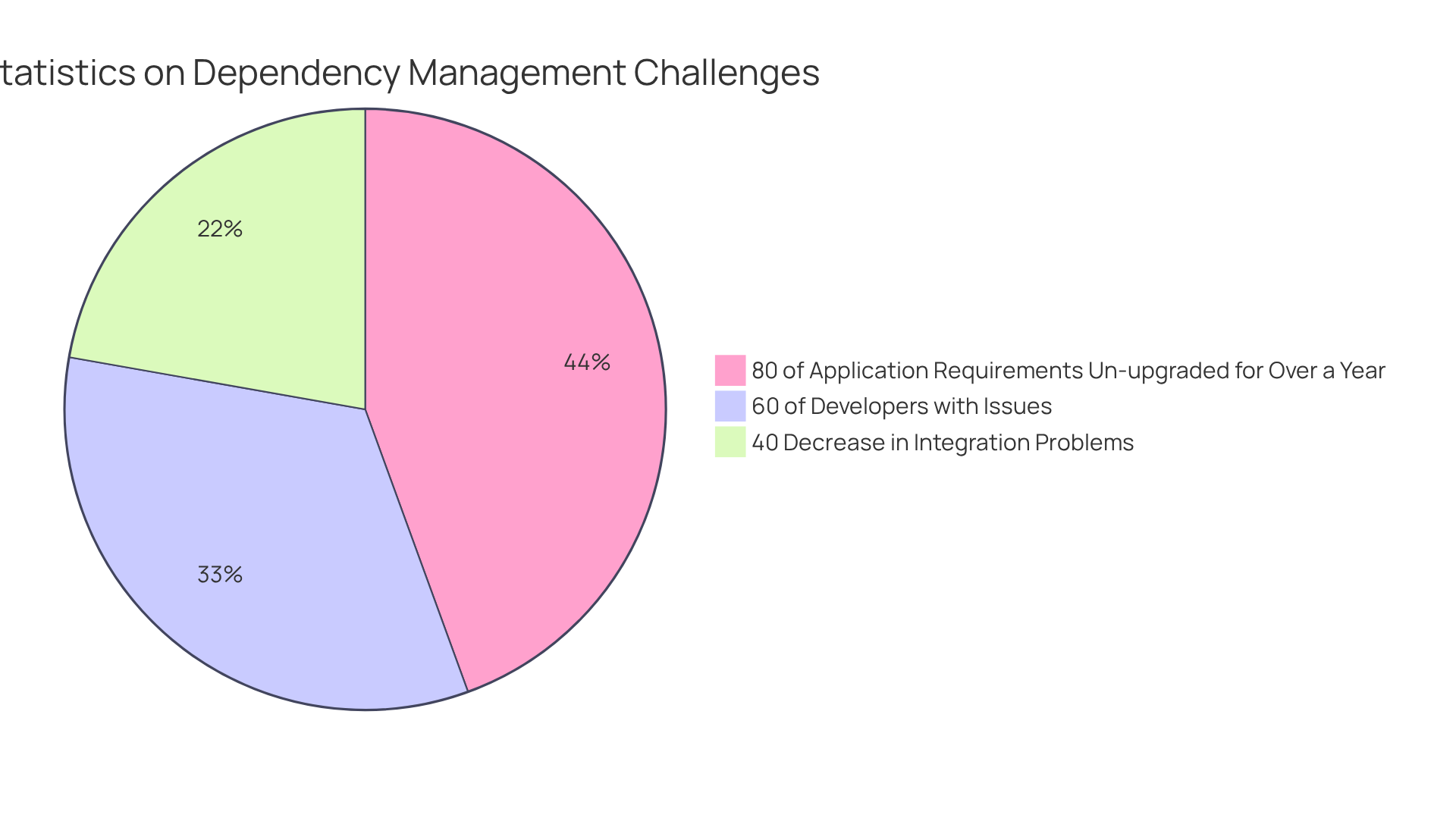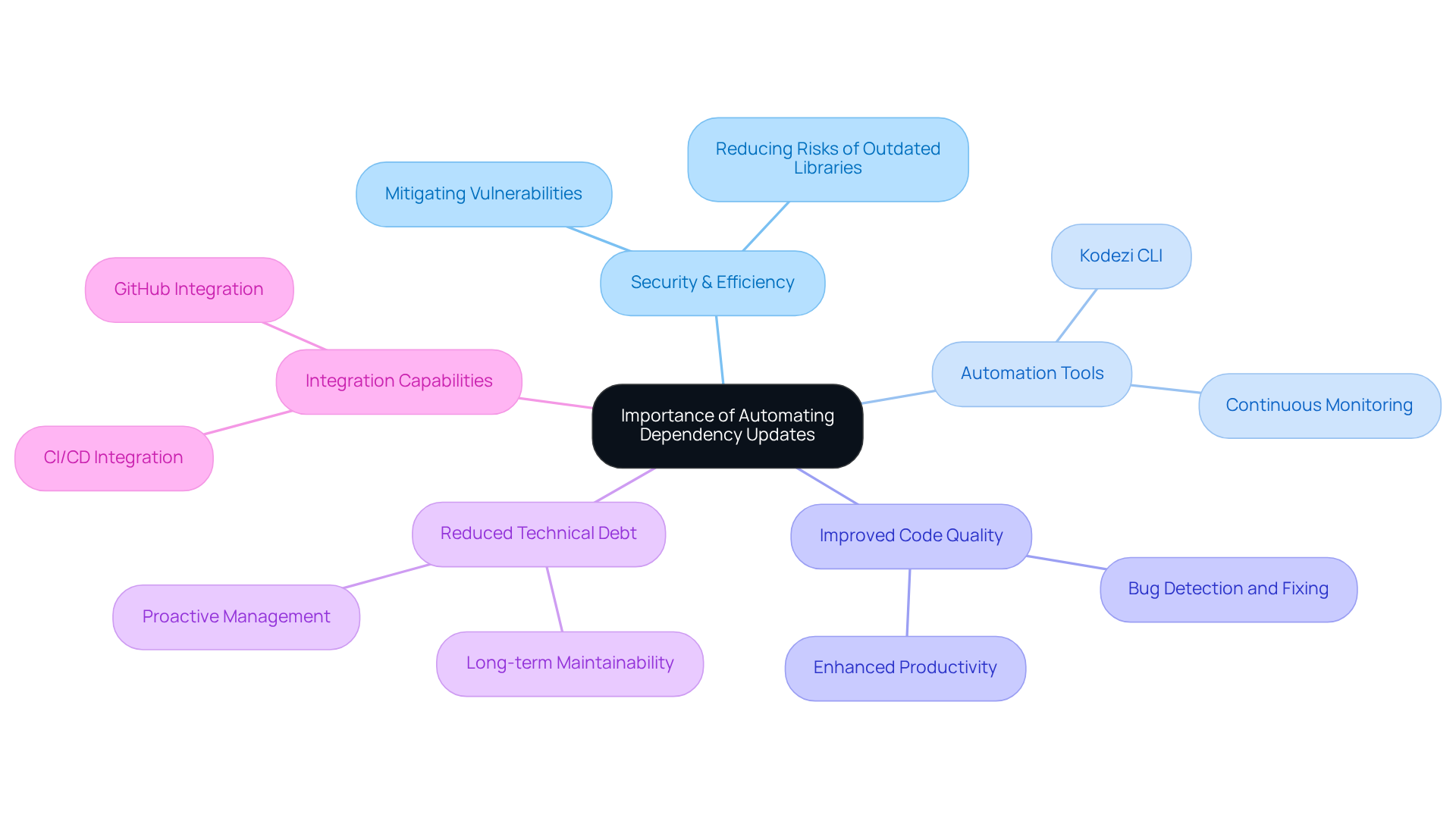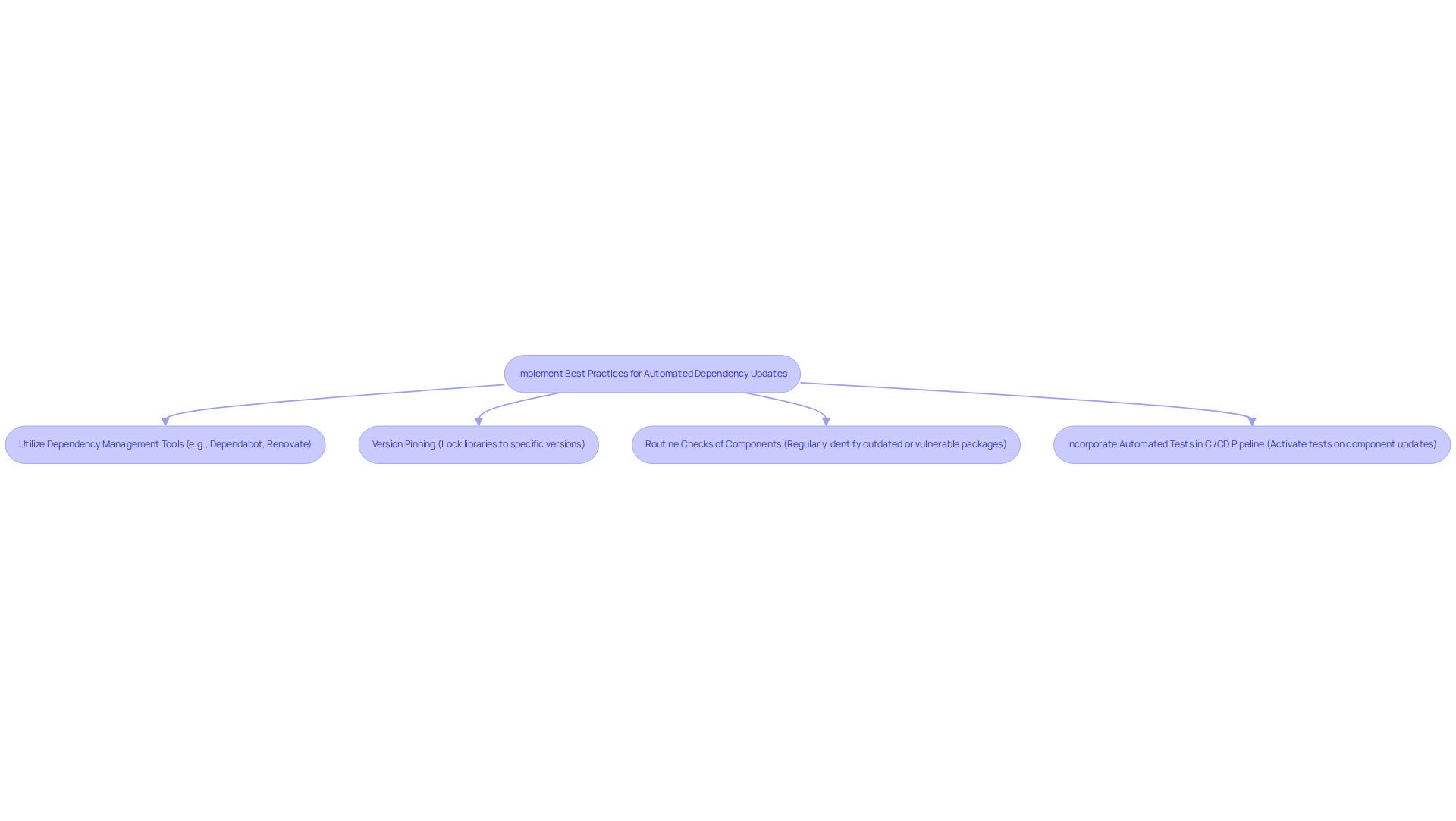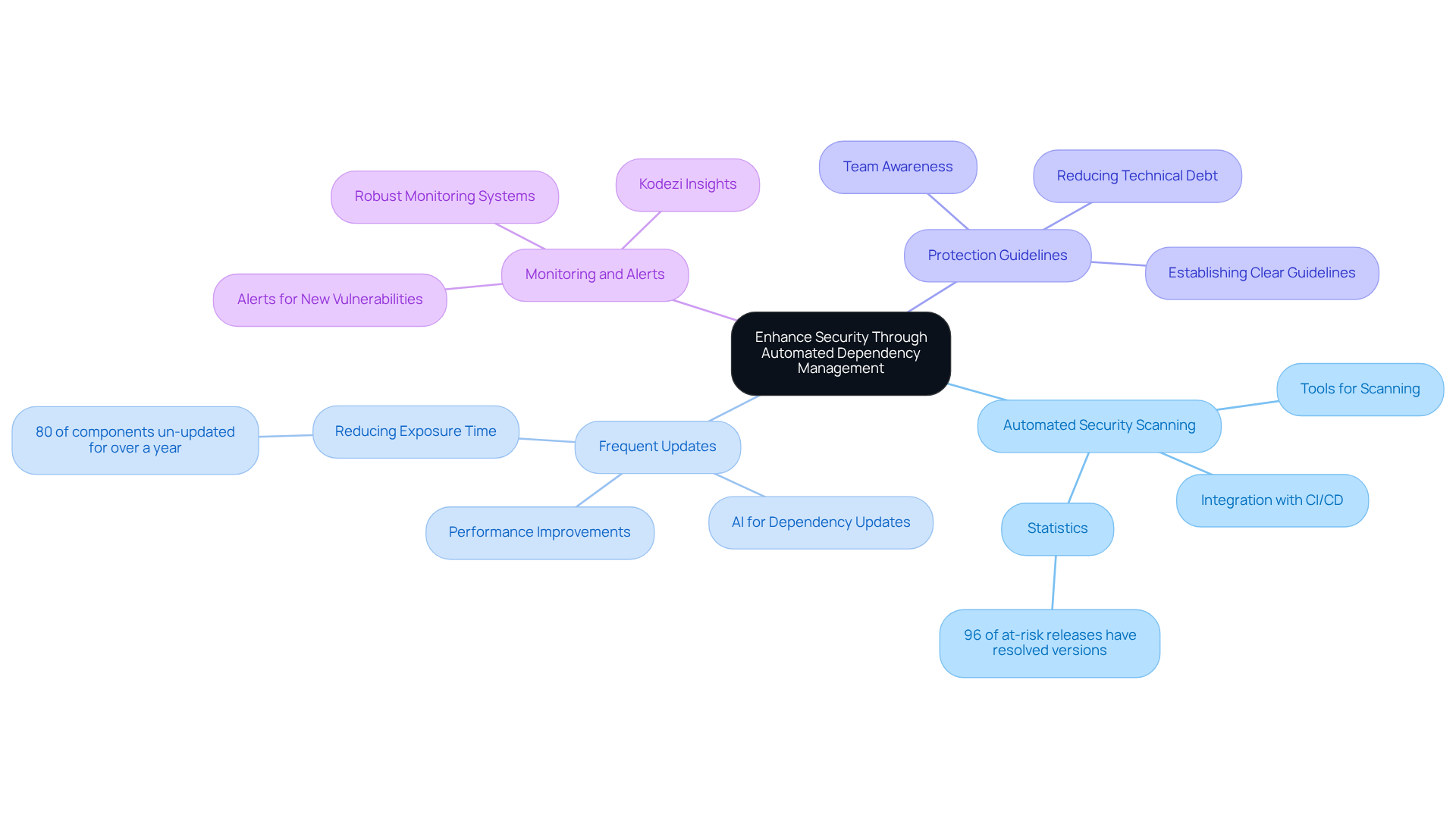Overview
In the fast-paced world of software development, developers often face significant challenges, particularly when it comes to managing dependencies. Automating these updates through AI can significantly enhance efficiency and streamline processes. Enter Kodezi CLI, a tool designed to tackle these common pain points. By automating dependency updates, Kodezi reduces integration problems by 40%, effectively mitigating security vulnerabilities associated with outdated libraries.
Imagine a scenario where developers no longer need to spend countless hours on routine maintenance. With Kodezi, they can shift their focus toward innovation and creativity, ultimately improving overall productivity and code quality. This shift not only enhances the development experience but also fosters a culture of continuous improvement within teams.
Furthermore, using Kodezi empowers developers to concentrate on what truly matters—building exceptional software. The benefits of increased efficiency and reduced risk of errors make it a compelling choice for teams looking to elevate their coding practices. Why not explore the tools available on the Kodezi platform and see how they can transform your development workflow?
In addition, Kodezi offers features that cater specifically to the needs of modern developers, ensuring that they can work smarter, not harder. With its user-friendly interface and powerful automation capabilities, Kodezi stands out as a vital resource in the developer's toolkit. Embrace the future of software development with Kodezi and unlock your team's full potential.
Introduction
Managing software dependencies presents a significant challenge for developers, impacting both project efficiency and security. As they navigate the complexities of outdated libraries and version conflicts, the potential for automation emerges as a transformative solution. By implementing innovative strategies to automate dependency updates, teams can enhance their workflows and strengthen their applications against vulnerabilities. Furthermore, how can organizations effectively adopt these automated solutions to ensure both security and streamlined development processes?
Understand Dependency Management in Software Development
Managing the libraries and packages essential for software functionality presents a critical challenge for developers, but ai automate dependency updates can help address this issue effectively. Did you know that 60% of developers encounter issues due to mismatched package versions? This statistic underscores the importance of maintaining a clear structure of requirements. Efficient oversight encompasses both direct requirements—those directly utilized by the project—and transitive requirements, which are necessary for the direct ones. Without effective management, teams can experience version conflicts, security vulnerabilities, and escalating technical debt, but these issues can be resolved more efficiently when we ai automate dependency updates.
Enter Kodezi CLI, a solution designed to tackle these challenges head-on. By consistently overseeing codebases and independently addressing library issues, Kodezi enables teams to focus on development without the burden of outdated libraries, allowing ai to automate dependency updates. Projects that ai automate dependency updates by utilizing automated resource management tools, like Kodezi, have reported a remarkable 40% decrease in integration problems. This proactive approach not only streamlines workflows but also enhances the maintainability and security of development processes.
Furthermore, with a staggering 80% of application requirements remaining un-upgraded for over a year, the need for effective management practices to ai automate dependency updates has become more urgent than ever. By understanding these concepts, teams can leverage Kodezi CLI to improve productivity and code quality. Why not explore the tools available on the platform and see how they can transform your coding practices?

Recognize the Importance of Automating Dependency Updates
Using ai to automate dependency updates is crucial for addressing the challenges developers encounter in maintaining a secure and efficient codebase. Regular updates are essential for mitigating security vulnerabilities; outdated libraries can significantly expose applications to risks. How can developers ensure they are using the most secure versions? Automation tools like Kodezi CLI not only oversee relationships but also ai automate dependency updates by independently creating pull requests for updates, ensuring teams consistently work with the latest, secure versions.
This proactive approach reduces the risk of bugs and compatibility issues that often arise from overlooked requirements. Additionally, it addresses performance bottlenecks and enhances code formatting. By embracing automation, engineering teams can utilize tools that ai automate dependency updates, allowing them to redirect their focus towards developing innovative features instead of being bogged down by routine maintenance tasks.
Furthermore, organizations that implement automated resource management with tools such as Kodezi experience improved code quality and reduced technical debt. This ultimately leads to the development of more robust and secure applications. In addition, integration capabilities with platforms like GitHub and CI/CD pipelines further streamline the process.
Why not explore the tools available on Kodezi? With automation becoming an indispensable practice for modern engineering teams, the benefits are clear: enhanced productivity, improved code quality, and a greater capacity for innovation.

Implement Best Practices for Automated Dependency Updates
To effectively implement ai automate dependency updates, developers often face significant challenges. These challenges can lead to vulnerabilities and inefficiencies within applications. However, by leveraging best practices, teams can ai automate dependency updates to streamline their processes and improve security.
Consider utilizing dependency management tools such as Dependabot or Renovate. These tools can ai automate dependency updates, allowing for the monitoring and updating of dependencies while creating pull requests that simplify the review and merging process. Organizations that have adopted Dependabot report substantial improvements in managing vulnerabilities, with ai automate dependency updates enabling teams to maintain a proactive stance. Statistically, outdated packages contribute to around 70% of security vulnerabilities in applications, highlighting the critical need for diligent tracking.
Another crucial practice is version pinning. Always locking libraries to specific versions prevents unexpected changes that could disrupt applications. This approach not only preserves stability but also facilitates controlled updates, thereby minimizing the risk of introducing breaking changes during upgrades. A case study revealed that employing lockfiles and setting version limits led to a notable reduction in build failures linked to external libraries.
Routine checks of components are also essential. Regularly identifying outdated or vulnerable packages can prevent security risks. Automation tools can aid in this endeavor by using ai to automate dependency updates and providing detailed reports on the status of requirements. With statistics indicating that 80% of application requirements remain un-upgraded for over a year and that 96% of vulnerable releases have a corrected version available, regular audits are vital for ensuring security and compliance.
Finally, ensure that your CI/CD pipeline incorporates automated tests that activate whenever related components are updated. This proactive strategy helps detect issues early in the development process, significantly lowering the risk of introducing bugs into production. Studies show that teams with automated testing experience fewer broken builds, enhancing overall software reliability.
By implementing these optimal techniques, engineering teams can effectively manage their requirements, reduce technical debt, and bolster the safety and stability of their applications.

Enhance Security Through Automated Dependency Management
Automated library management is crucial for enhancing security by ensuring that libraries and packages are consistently updated with the latest protection patches. Consider these effective strategies to strengthen security through automation:
-
Automated Security Scanning: Utilize tools that automatically scan dependencies for known vulnerabilities. These solutions can seamlessly integrate with your CI/CD pipeline, providing immediate feedback on vulnerabilities and ensuring that 96% of at-risk releases, which have resolved versions available, are promptly addressed. Furthermore, Kodezi's automated code debugging capability helps detect and resolve issues in your codebase, ensuring compliance with the latest safety best practices.
-
Frequent Updates: Implement ai to automate dependency updates, enabling regular checks and applications of updates to components, particularly those known to have vulnerabilities. This proactive approach significantly reduces the exposure time to potential risks, as 80% of application components remain un-updated for over a year. Kodezi streamlines this process by addressing performance bottlenecks and ensuring that your code meets coding standards, facilitating smoother and more efficient updates.
-
Protection Guidelines: Establish clear protection guidelines for managing external libraries. It is vital for all team members to recognize the importance of keeping connections current and to understand how ai automate dependency updates can support this process, thereby reducing technical debt and enhancing software quality. Kodezi's CLI can enforce these policies, ensuring that your team consistently adheres to safety standards.
-
Monitoring and Alerts: Develop robust monitoring systems that alert your team to any newly identified vulnerabilities in the resources you utilize. This enables prompt action to mitigate risks, ensuring that your software remains secure and compliant with evolving standards. Kodezi's insights into code issues can further bolster your monitoring efforts, offering detailed explanations of vulnerabilities and guidance on how to resolve them.
By implementing these strategies, organizations can effectively manage their interdependencies, minimize the risk of security breaches, and uphold high-quality software. Additionally, it is essential to recognize that managing direct dependencies can impact up to 170 transitive connections, highlighting the complexity of overseeing these relationships. The Log4Shell vulnerability in Log4j serves as a stark reminder of the repercussions of neglecting to update dependencies, underscoring the critical necessity for proactive management.

Conclusion
Automating dependency updates through AI presents a transformative opportunity for software development teams, enhancing both efficiency and security. Developers often grapple with the challenges of managing libraries and packages, leading to risks associated with outdated dependencies. By leveraging tools such as Kodezi CLI, teams can streamline this management process, significantly reducing these risks. This proactive approach not only mitigates version conflicts and security vulnerabilities but also allows developers to focus on innovation rather than routine maintenance.
Throughout the article, key strategies for implementing automated dependency management have been highlighted. These include:
- Utilizing effective tools like Dependabot
- Adopting version pinning
- Performing regular checks on dependencies
Each of these practices contributes to a more secure and efficient development process, ensuring that applications are built on stable and updated foundations. Furthermore, the importance of integrating automated testing within CI/CD pipelines cannot be overstated, as it serves to catch potential issues early in the development cycle.
In conclusion, embracing AI-driven automation for dependency updates is not merely a trend but a necessity for modern software development. As the landscape of software projects continues to evolve, organizations must prioritize these practices to enhance security, reduce technical debt, and ultimately deliver higher quality applications. The call to action is clear: explore the tools and strategies available to transform dependency management and safeguard the future of your software projects.
Frequently Asked Questions
What is the main challenge developers face regarding dependency management in software development?
Developers face the critical challenge of managing the libraries and packages essential for software functionality, which often leads to issues due to mismatched package versions.
What percentage of developers encounter issues due to mismatched package versions?
60% of developers encounter issues due to mismatched package versions.
What are direct and transitive requirements in dependency management?
Direct requirements are those libraries and packages directly utilized by the project, while transitive requirements are those necessary for the direct requirements to function properly.
What issues can arise from ineffective dependency management?
Ineffective dependency management can lead to version conflicts, security vulnerabilities, and escalating technical debt.
How can automating dependency updates help developers?
Automating dependency updates can help resolve issues more efficiently, allowing developers to focus on development without the burden of outdated libraries.
What is Kodezi CLI and how does it assist in dependency management?
Kodezi CLI is a solution designed to tackle dependency management challenges by overseeing codebases and addressing library issues independently, enabling teams to automate dependency updates.
What improvements have projects experienced by utilizing automated resource management tools like Kodezi?
Projects that automate dependency updates using tools like Kodezi have reported a 40% decrease in integration problems.
Why is there an urgent need for effective management practices in dependency updates?
There is an urgent need for effective management practices because 80% of application requirements remain un-upgraded for over a year, highlighting the importance of maintaining updated libraries.
How can teams leverage Kodezi CLI to improve their development processes?
Teams can leverage Kodezi CLI to improve productivity and code quality by utilizing its tools for better dependency management and automation of updates.




